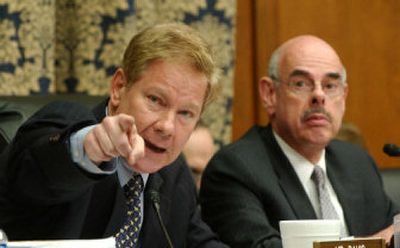House panel approves subpoena for Rice

WASHINGTON – Congressional Democrats authorized five subpoenas Wednesday in their drive to step up oversight of the Bush administration, a move likely to heighten tensions between the majority party on Capitol Hill and the White House.
The House Oversight and Government Reform Committee approved a subpoena to compel Secretary of State Condoleezza Rice to testify about the administration’s false prewar claim that Iraq had tried to buy uranium.
And the panel authorized subpoenas directing the Republican National Committee to turn over information in an investigation of whether administration officials used the political committee’s e-mail to conduct government business.
A House committee also moved to force the testimony of Monica M. Goodling, a former Justice Department liaison to the White House and a pivotal figure in an investigation into the U.S. attorneys firings.
The action came as a top Democrat said the Bush administration has politicized the executive branch.
“Not since the days of Watergate, when our judicial system and intelligence community were deployed by the White House in the service of partisan politics, have we seen such, in my view, abuses,” House Democratic Caucus Chairman Rahm Emanuel of Illinois said in a speech at the Brookings Institution.
A White House spokeswoman called the attack an effort to divert attention from the House Democrats’ failure to get any of the bills from their first 100-hours agenda enacted into law.
The subpoenas drew sharp criticism from Republicans.
“This is just politics,” said Rep. Tom Davis of Virginia, top Republican on the Oversight and Government Reform Committee. He accused committee Chairman Henry A. Waxman, D-Calif., of using subpoenas to get high-profile administration figures under oath “for the sake of political theatrics.”
Waxman said he repeatedly has tried to learn from Rice what she knew about the assertion Bush made in his 2003 State of the Union speech that Iraq had tried to obtain uranium from Niger.
“My goal is to conduct investigations without subpoenas. But if we are stonewalled, we can’t hesitate to use the power we have,” he said.
The subpoena to the RNC directed the committee to produce information about the use of its e-mail accounts by White House officials. A separate subpoena was authorized to call RNC Chairman Mike Duncan to appear before the committee May 8.
Waxman is investigating whether administration officials – including the president’s chief political strategist, Karl Rove – attempted to circumvent the Presidential Records Act, a post-Watergate law designed to preserve White House records, by using RNC e-mail accounts to conduct government business. The RNC accused Democrats of trying to get a hold of the party’s political playbook.
The House Judiciary Committee, meanwhile, agreed to seek immunity from prosecution for Goodling, a former top aide to Attorney General Alberto Gonzales, and authorized Chairman John Conyers, D-Mich., to subpoena her testimony.
Goodling has vowed to assert her Fifth Amendment right against self-incrimination if called to testify before congressional committees. House lawyers must still obtain a court order granting her immunity from prosecution, a process that could take several weeks.
Also Wednesday, Sen. Charles E. Schumer, D-N.Y., raised concerns about reports that the chief of staff to Rep. Rick Renzi, R-Ariz., had called the U.S. attorney’s office in Phoenix in October, inquiring about media reports of an investigation arising out of a 2005 land deal involving Renzi.
In a letter to Gonzales, Schumer said the contacts “could potentially be construed as designed to inappropriately affect the timing of charging decisions in a politically sensitive investigation around the time of the November election.”
The U.S. attorney at the time, Paul Charlton, was among the top prosecutors who were dismissed last year. Charlton declined comment.
In a statement, the Renzi aide, Brian Murray, acknowledged he had contacted Charlton’s press secretary about pre-election day news accounts alleging a pending indictment.